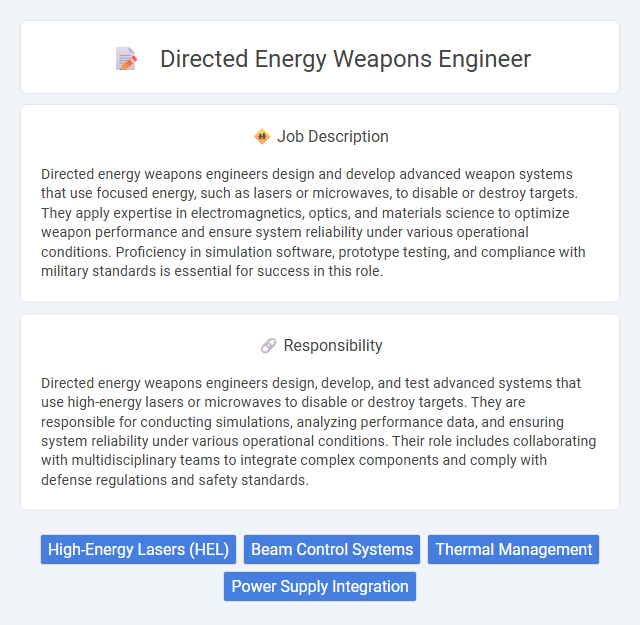
Directed energy weapons engineers design and develop advanced weapon systems that use focused energy, such as lasers or microwaves, to disable or destroy targets. They apply expertise in electromagnetics, optics, and materials science to optimize weapon performance and ensure system reliability under various operational conditions. Proficiency in simulation software, prototype testing, and compliance with military standards is essential for success in this role.
Individuals who possess strong analytical skills, a solid foundation in physics and engineering, and a high tolerance for working in high-pressure environments are likely to be suitable for a Directed Energy Weapons Engineer role. Candidates comfortable with advanced technology and complex problem-solving may adapt well to the demands of designing and testing cutting-edge weapon systems. Those who struggle with intense technical challenges or thrive better in less specialized fields might find this career less fitting.
Qualification
A Directed Energy Weapons Engineer must possess a strong background in electrical engineering, optics, and laser technology, often supported by a bachelor's or master's degree in engineering or physics. Proficiency in electromagnetic theory, laser design, beam control systems, and experience with high-power microwave or laser systems is essential. Skills in programming, simulation software, and knowledge of materials used in laser weapons systems enhance capability to develop, test, and optimize cutting-edge directed energy weapons.
Responsibility
Directed energy weapons engineers design, develop, and test advanced systems that use high-energy lasers or microwaves to disable or destroy targets. They are responsible for conducting simulations, analyzing performance data, and ensuring system reliability under various operational conditions. Their role includes collaborating with multidisciplinary teams to integrate complex components and comply with defense regulations and safety standards.
Benefit
A Directed Energy Weapons Engineer likely benefits from working at the forefront of advanced military technology, contributing to the development of cutting-edge defense systems. This role may offer opportunities for high earning potential and career advancement within defense and aerospace sectors. Exposure to innovative projects could also enhance specialized skills and professional expertise in laser and electromagnetic weaponry.
Challenge
A directed energy weapons engineer will likely face complex challenges in developing high-precision systems that require advanced knowledge of electromagnetics, optics, and materials science. The role probably involves integrating cutting-edge technologies to ensure weapon accuracy and reliability under various operational conditions. Managing thermal effects and energy efficiency may present ongoing obstacles that demand innovative problem-solving skills.
Career Advancement
Directed energy weapons engineers design and develop advanced laser, microwave, and particle beam systems for defense applications, ensuring cutting-edge technological integration. Mastery in electromagnetics, optics, and materials science opens pathways to lead multidisciplinary research teams and manage large-scale defense projects. Career advancement often involves transitioning into senior engineering roles, strategic development positions, or specialized leadership in defense technology innovation.
Key Terms
High-Energy Lasers (HEL)
Directed energy weapons engineers specializing in High-Energy Lasers (HEL) design and develop advanced laser systems capable of delivering focused energy to neutralize threats with precision and speed. They utilize expertise in photonics, thermal management, and optical systems to optimize laser output, beam control, and target tracking for defense applications. Proficiency in electromagnetic spectrum analysis, power generation, and system integration is critical to advancing HEL technology for military and aerospace sectors.
Beam Control Systems
Directed energy weapons engineers specializing in Beam Control Systems design and optimize advanced targeting mechanisms for laser and microwave weapons. They develop precision steering algorithms, adaptive optics, and real-time feedback control to maintain beam stability and accuracy over varying atmospheric conditions. Expertise in signal processing, hardware integration, and electromagnetic theory is essential for enhancing system performance and operational reliability.
Thermal Management
Directed energy weapons engineers specializing in thermal management design and implement cooling systems to dissipate heat generated by high-energy laser and microwave weapons, ensuring operational stability. They analyze thermal loads using advanced simulation tools and develop innovative materials and heat sinks to prevent overheating and maintain peak performance. Expertise in fluid dynamics, thermodynamics, and heat transfer is essential to optimize weapon efficiency and reliability during extended use.
Power Supply Integration
Directed energy weapons engineers specializing in power supply integration design and optimize high-performance energy storage and conversion systems to ensure stable and efficient delivery of electrical power to laser or microwave weapon components. Expertise in integrating capacitors, batteries, and power conditioning units is critical to managing rapid energy discharge and thermal loads while maintaining system reliability. Advanced knowledge in electrical engineering, thermal management, and system diagnostics enhances the development of compact, robust power modules essential for field-deployable directed energy weapon platforms.
 kuljobs.com
kuljobs.com